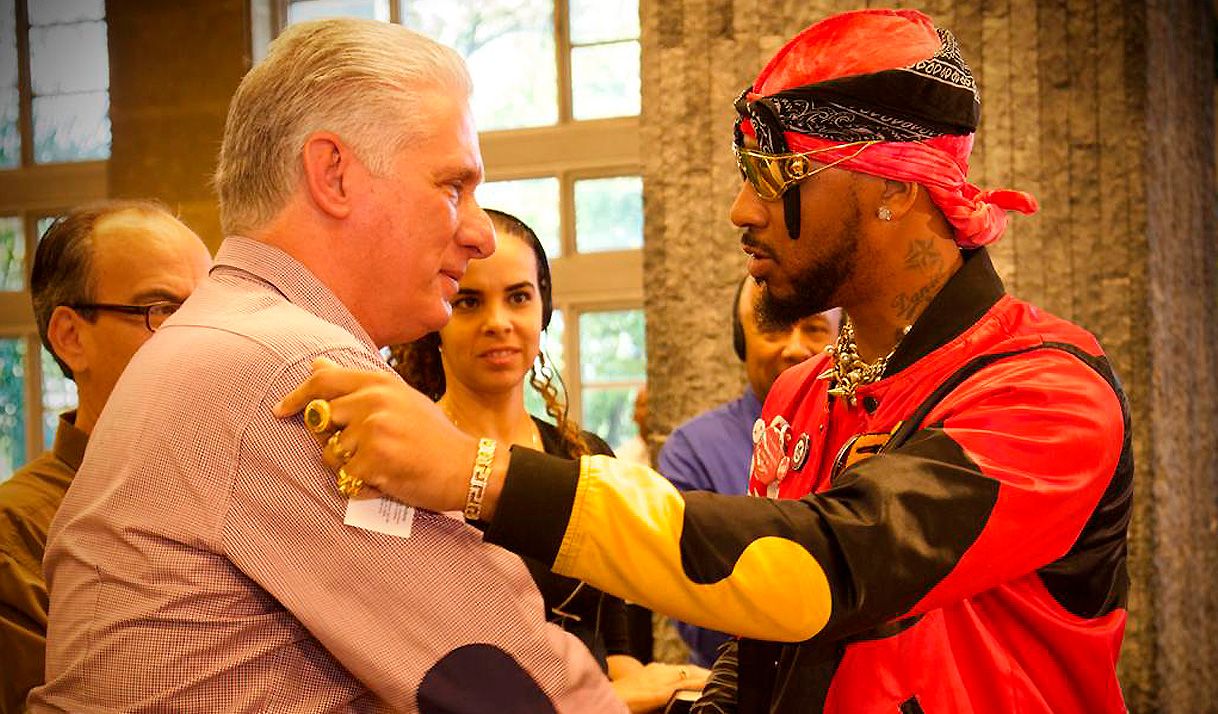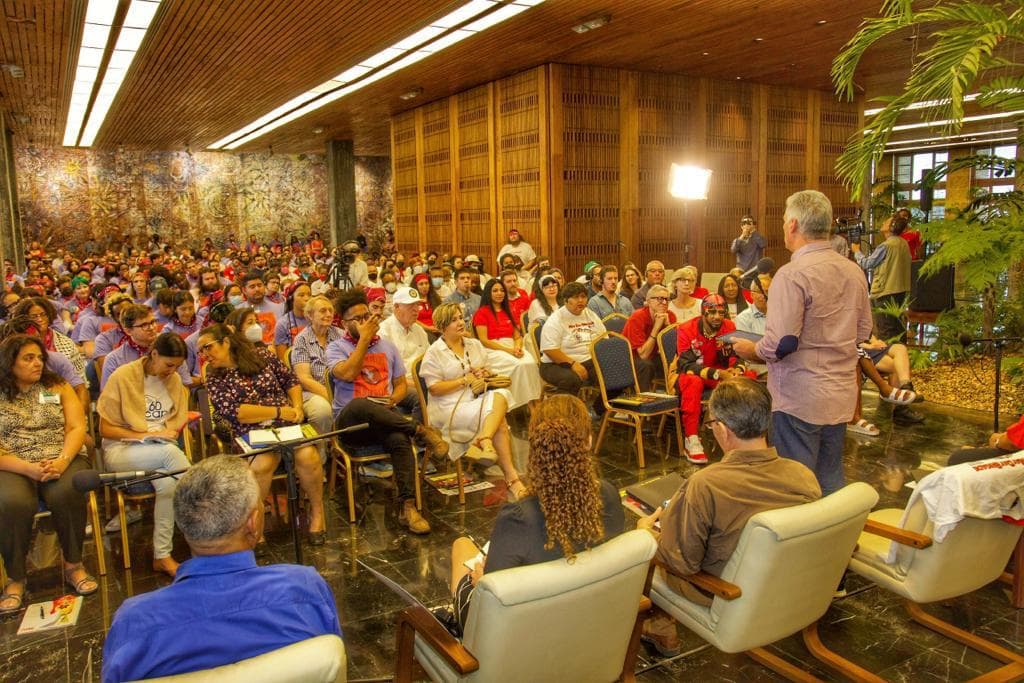
Union leader Christian Smalls, part of a U.S. solidarity delegation that visited Cuba recently.
Cuba as a Spectacle for Foreign Activists
5 / mayo / 2023
In a comment posted on April 26, Calla Walsh, a youth from the United States who defines herself as an anti-imperialist organizer and works as a writer and co-chair of the National Network on Cuba, wrote: “Excluding the pandemic years, this will be the first time since 1994 that Cuba won’t march on May First with a massive spectacle in the Plaza de la Revolucion. Because the United States is blockading fuel shipments to Cuba!”
Calla’s post refers to the suspension of the traditional march held in Cuba for International Workers’ Day, known in the official media as “March of the Combatant People.” The immediate cause was the fuel crisis (especially gasoline), which made it impossible to dispatch transport vehicles from the various municipalities of the capital to the Plaza.
In Walsh’s vision of events (which, more than her own, represents the vision of a sector of US activists and organizations that ally themselves with the Cuban government), the sole cause of the fuel crisis is the US economic embargo. However, she doesn’t consider the endogenous factors that have contributed to the paralysis and chronic crisis of the national energy system.
Attributing Cuba’s national problems to the set of US economic sanctions generally referred to as “the blockade,” is one face of the US group’s rhetoric. The other is unconditional support for the regime, which they normally describe as the “Cuban people,” in the typical assumption that, in Cuba, government and society are one and the same.
The most revealing thing about the conception that underlies the view of the activists and organizations is their reference to May Day as a “massive spectacle.” Although the parades that make up the Labor Day celebrations in Cuba could be classified as spectacles in terms of their massive participation (in decline in recent years) and the logistical deployment that usually accompanies them, the reference to “spectacle” can also be read in another way – as something whose primary purpose is to create an image, in disregard of the underlying reality.
This interpretation of “spectacle” is also in line with the overall view of the brigades and delegations which, particularly after the events of July 11 [on that date in 2021, spontaneous protests broke out in dozens of Cuban municipalities], frequently visit Cuba. Upon their return home, they offer testimony – in the style of the political pilgrims of the Revolution’s first years – about a country that is all too similar to their own ideal version of it. A country that is, neither more nor less, a spectacle for those who need to validate the utopias born from their opposition to a social reality (in the United States) which they are radical critics of. Of course, a person’s right to be radically critical of their reality isn’t in question; however, it’s very problematic if they’re making use of an outside reality and transforming it into the idealized projection of their desires.

Cuban President Diez-Canel, meeting with the US delegations at the International Meeting of Solidarity with Cuba on May 1, 2023.
For activists like Calla, Cuba is a theme park, a spectacle. As such, it requires a distorted gaze, starting from the fundamental act of alienation that consists of seeing exactly what one wants to see and nothing more, and transforming their perception and critical judgement to an interminable chain of confirmation of the preconceptions and suppositions. However, it also requires an effort to create a scenario that avoids, in a consistent way, any possible dissonance between the perceived and what one wants to perceive.
Hence, when one of the delegations visits an agricultural camp, it’s not just any camp but an international one destined for such a program. (“Julio Antonio Mela” International Camp), When a neighborhood is visited, it’s a special one, where special programs are being developed; and when there are talks with “autonomous civil society organizations” you speak with representatives previously chosen by the Communist Party and Government leadership for their subordination to power. The “spectacle” they expect and receive in exchange for the reinforcement of their ideals is directly translated into their reproduction of the narrative of a country that doesn’t exist.
The image of the theme park is the result of close collaboration: the Cuban government institutions prepare the scenario for visitors, who expect to see exactly what they are shown; a closed circle that produces over and over again “testimonies” on matters that many Cubans would find bizarre and absurd, but that the authoritarian-loving anti-imperialism public —the tankies— find true —and if not true by themselves, at least attractive enough to swallow without question.
The insistently imperial character of the “witnesses” is clearly revealed by their insistence on listening only to those who reinforce their vision of the world: the Cuban authorities. The same authorities who are responsible for the economic disaster and political repression that the people of the island suffer. These officials enchant the US brigades with phrases like “the Cuban people are the owners of the hotels.” Such is also made evident by their refusal to listen to voices that come from another place and could cause their preconceived certainties to wobble. The spectacle doesn’t admit deviations; “the show must go on.”
After completing a packaged tour of Cuba, the “witnesses” -whose reliability seems to derive precisely from their ideological affiliation with the Cuban Government, and whose declarations assume a space that rightly corresponds to lower-ranking Cuban voices – tell incredible stories from a non-existent country. The list of stories is long and painful, a theme park language with its own contents and syntax.
According to the activists’ stories, in Cuba there are “democratic unions that negotiate with the government”; “In fact, the Cuban people are the government.” They speak of autonomous communities, (?), especially one where a group of children repeat along with a US union organizer: “Cuba, yes, blockade no!” And urban gardens, where a brigade from the National Network on Cuba can do two months of work in one morning, together with the “revolutionary Cuban people.”
One of the brigades that are currently in Havana, part of the thousand-plus foreigners invited to the May Day 2023 celebrations, was organized in March by the National Network on Cuba in collaboration with the Cuban Institute of Friendship with other Peoples (ICAP). The activity could be called political tourism since the explicit objective is for political activists in their countries of origin to visit the island as a form of support for the Cuban government.
For example, the International People’s Assembly posted on April 24 that 156 youth leaders would travel to Cuba in opposition to the US blockade, and that in the following days they’d meet with different sectors of Cuban society (artists, scientists, youth, union organizations, LGBTQI+, and anti-racist community activists). In that way they’d have “the opportunity to hear first-hand about the impact of six decades of illegal blockade, and how – despite this – the Cuban people are resisting and continuing to develop their nation.”

US delegates to Cuba, May 2023.
The post (which talks about meetings that had not occurred at the time of publication) anticipates the content of what will be heard in the meetings, thus revealing that it’s a pre-established agenda and allowing us to infer what’s common knowledge: that the participating Cuban actors do not represent autonomous sectors of Cuban society. Instead, they are subordinated to the government agenda. Listening – which would presuppose the possibility of unexpected contents arising – is thus evidenced as an empty ritual, a staged session in which the expectation and the result correspond completely.
The role that the brigades, organizations, and foreign activists play in reproducing the narratives that best serve the power structure in Cuba indirectly testifies to the loss of credibility these narratives have inside Cuba. As the Revolution and socialism’s promises have dissolved, giving way to an undisguised repression; as the achievements of years past have given way to a reality of extreme precariousness in everyday life; as the government plutocracy tightens its grip on power with a rapacious economic policy that can’t satisfy the basic needs of the population; as all these realities converge, sustaining the official narratives requires ever more the participation of outside actors.
These visitors base their defense of a collapsed regime not on the lived experience of those within it (their contact is never more than that of a tourist that comes for a short visit, with favorable conditions for their stay) but on the projection of a fantasy they can utilize to sustain political agendas in their countries of origin. From there come recurring declarations that the United States has a lot to learn from Cuba, and the assertions of a supposed cover-up and distortion of the Cuban reality on the part of the hegemonic media, for which they then constitute the alternative source of information.
The Cuban spectacle seeks to impose itself over the lived Cuba. The idealized foreign gaze, a willing accomplice to the Cuban government, seeks to impose itself over the Cuban view of itself. But in the end, reality will always prevail, despite these efforts to materialize and perpetuate a theme park for the particular consumption of alienated idealists and accomplices of those creating propaganda.
This article was translated into English from the original in Spanish.









comments
We moderate comments on this site. If you want to know more details, read our Privacy Policy
Your email address will not be published. Mandatory fields are marked with *